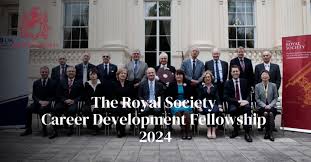APPLY NOW! Career Development Fellowship 2024
Overview
This scheme provides the most talented early career scientists from underrepresented groups in STEM with research funding and high-quality training opportunities to build a strong base for a successful research career.
About the scheme
The Career Development Fellowship (CDF) is a four-year, postdoctoral research fellowship that aims to support the retention in STEM of researchers from underrepresented backgrounds. Fellowships will provide funding to conduct high-quality research and a comprehensive programme of mentoring, training and networking opportunities to support award holders in establishing a successful research career in the UK.
The scheme has been developed following cross-sector roundtables and Royal Society-commissioned reports which looked at trends across 11 years of Higher Education Statistics Authority (HESA) data and benchmarked the Society’s early career fellowships (PDF) against the eligible applicant pool.
This process identified a need for interventions across the academic pipeline to support researchers from Black or Mixed Black African, Black Caribbean or other Black heritage backgrounds, particularly researchers making the transition from postgraduate to early postdoctoral stages.
The scheme will initially run as a pilot with researchers from Black heritage. If successful, the pilot may be broadened to researchers from other underrepresented groups.
This fellowship aims to:
- Support talented early career researchers from underrepresented backgrounds in taking the first step towards establishing their research in a UK institution
- Provide researchers with the opportunity to undertake high-quality curiosity-led research
- Provide the most promising researchers with the mentoring, networking opportunities, training and support required to establish a successful research career in the UK
- Support talented researchers from underrepresented groups to pursue a career in STEM and strengthen the UK scientific workforce
The Royal Society recognises that diversity is essential for delivering excellence in science, technology, engineering and mathematics (STEM). The Society wants to encourage applications from the widest range of backgrounds, perspectives and experiences to maximise innovation and creativity in science for the benefit of humanity. We regularly review and revise policies and processes to embed equity, diversity and inclusion (EDI) principles in all aspects of the grant making process and ensure all talented applicants have an equitable chance to succeed as per assessment criteria.
See below for details of adjustments we can provide for disabled applicants.
Changes to the scheme
For the second round of the pilot, applications should be submitted by researchers who are UK nationals or have completed a part of their education in the UK through their Undergraduate, Master’s or PhD degree studies or hold/have held a postdoctoral researcher position in the UK.
Please make sure to read the latest scheme notes carefully before applying and be aware that the Royal Society runs other award schemes that you may be eligible for.
What does the scheme offer?
Applicants can apply for up to £690,000 over four years.
Funds can cover:
- Contribution to the Research Fellow’s salary and associated on-costs (at 80%)
- Directly allocated costs (at 80%)
- Research expenses
- Relocation and visa costs for themselves and their dependants (partner and children) can be requested in addition to the total grant cap of £690,000 over four years.
The scheme includes a bespoke, high-quality programme of training, mentoring and engagement to support career development
Full funding details can be found in the scheme notes and in the Royal Society Funding Guidance.
We provide flexibility to accommodate personal circumstances including part-time working, sabbaticals and secondments. There is provision for maternity, paternity, adoptive or extended sick leave, as well as financial support for childcare costs that arise from attending conferences and research visits. In addition to the tailored programme of training, mentoring and engagement provided to scheme participants, Royal Society Research Fellows also have the opportunity to access a range of career development and engagement opportunities including training on leadership, science communication and public engagement, and activities coordinated by our science policy and schools engagement teams. For further detail on these additional benefits, read our opportunities page.
Eligibility
- You self-identify as being from a Black heritage, including mixed Black background;
- You are a UK national or you have completed a part of your education in the UK through your Undergraduate, Master’s or PhD degree studies or you hold/have held a postdoctoral researcher position in the UK;
- You have a PhD, or will have one by the time the funding starts, but have less than 24 months post-doctoral experience
and - Your research is within the Royal Society’s remit of natural sciences, which includes but is not limited to biological research and biomedical sciences, chemistry, engineering, mathematics and physics. For a full list, please see the breakdown of subject groups and areas supported by the Royal Society.
Both UK and non-UK domiciled researchers who wish to conduct their research in the UK are eligible. Applicants can be of any nationality and those requiring a visa are eligible to apply for a Global Talent Visa under the fast-track process of endorsement.
Read the scheme notes for further information on eligibility. Please ensure that you meet all eligibility requirements before applying.
Application and assessment process
You will apply through our application and grant management system, Flexi-Grant®.
See the ‘Application and assessment process’ page for a general overview of the application and selection steps.
Assessment of your application will be overseen by the Career Development Fellowship panel.
Shortlisted applicants will be invited to an in-person interview at the Royal Society. The aim of the interview is for you to demonstrate the importance and scientific validity of your work.
Further detail on the application and review process is available in the scheme notes.
Application opens: 24 September 2024





